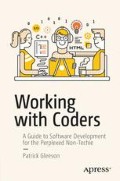Abstract
People who write software for a living spend their professional lives thinking about things that people with other jobs don’t think about, and thinking about them in a way that’s different to how people with other jobs think.
Access this chapter
Tax calculation will be finalised at checkout
Purchases are for personal use only
Notes
- 1.
Yes, there are exceptions, of course, and if you work building physics engines for immersive VR/augmented reality installations feel free to scoff at me for my reductionist simplifications.
- 2.
For the avoidance of all doubt, I am talking about bits in the colloquial sense, not in the “1 or 0” sense!
- 3.
- 4.
Other than the occasional banner ad that contributes to the cost of hosting the blog itself.
- 5.
Or sometimes, when the content is for a company blog, to help the company attract candidates.
- 6.
- 7.
It’s a little bit like falling in love with someone before you know them well. You simply cannot imagine them having any faults, because that would jar so much with the merits that you have seen so far, and your infatuation is propelled by a part-imagined, utterly unrealistic picture of perfection. Love only reaches maturity when you know someone so well that you are familiar with both their virtues and their flaws, and you love the sum total. Or, as Shakespeare puts it in A Midsummer Night’s Dream, “Love looks not with the eyes, but with the mind, and therefore is winged Cupid painted blind.”
- 8.
Although, as I’ve argued in the previous chapter, if you are able to hire someone smart that may not matter too much.
- 9.
Apologies. Depending on how you look at it that’s either a mixed metaphor or an unnecessarily complicated one, perhaps featuring a malicious cyclist inside a giant snow-covered hamster wheel pelting down a slope.
- 10.
- 11.
- 12.
I know you’ve seen at least a few lines in your life. Unless you’ve only been skipping through this book (in which case shame on you), you’ll have come across a few of them dotted through earlier chapters.
- 13.
If you’re dealing with complicated logic in a single big chunk of code, something called “control flow” is used to break up the logic into a sort of decision tree, using commands that say things like “If X is true, do this, otherwise do that.” The different levels of the decision tree are represented in most major languages by progressive levels of indentation, so that the code creeps further and further to the right. The more logic in a single chunk, the harder it is to understand, and the further to the right the code ends up being. The elegant solution is normally to break up the logic into smaller, easier-to-understand chunks, and it’s generally the case that at the start of each chunk you get to reset your indentation level and scooch your code back to the left.
Author information
Authors and Affiliations
Rights and permissions
Copyright information
© 2017 Patrick Gleeson
About this chapter
Cite this chapter
Gleeson, P. (2017). Programmer Preoccupations. In: Working with Coders. Apress, Berkeley, CA. https://doi.org/10.1007/978-1-4842-2701-5_8
Download citation
DOI: https://doi.org/10.1007/978-1-4842-2701-5_8
Published:
Publisher Name: Apress, Berkeley, CA
Print ISBN: 978-1-4842-2700-8
Online ISBN: 978-1-4842-2701-5
eBook Packages: Business and ManagementApress Access BooksBusiness and Management (R0)

